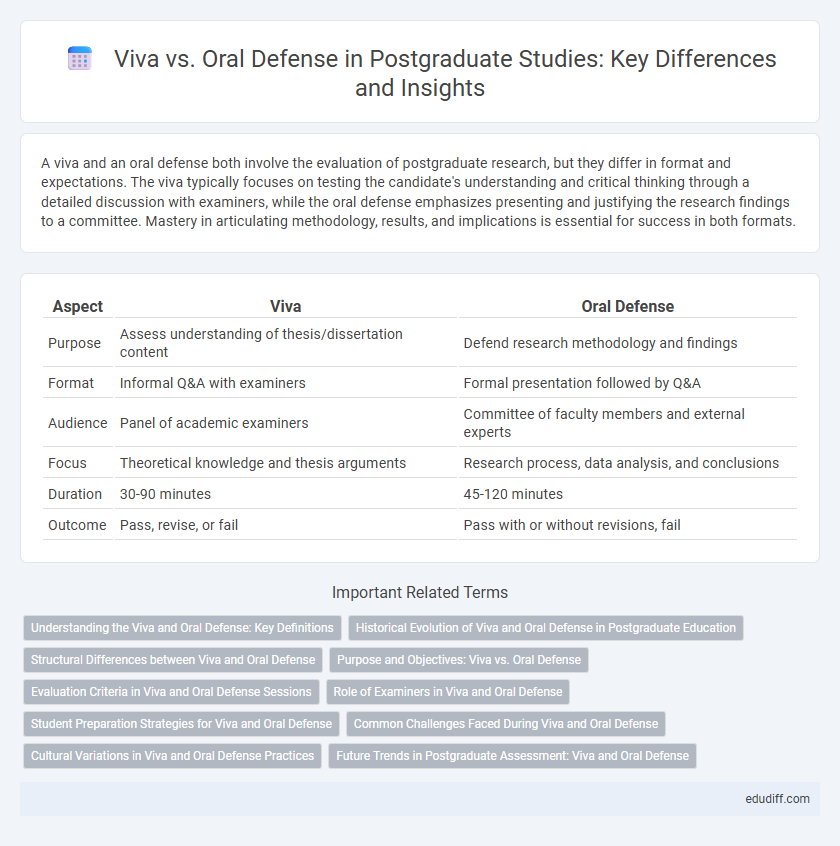A viva and an oral defense both involve the evaluation of postgraduate research, but they differ in format and expectations. The viva typically focuses on testing the candidate's understanding and critical thinking through a detailed discussion with examiners, while the oral defense emphasizes presenting and justifying the research findings to a committee. Mastery in articulating methodology, results, and implications is essential for success in both formats.
Table of Comparison
| Aspect | Viva | Oral Defense |
|---|---|---|
| Purpose | Assess understanding of thesis/dissertation content | Defend research methodology and findings |
| Format | Informal Q&A with examiners | Formal presentation followed by Q&A |
| Audience | Panel of academic examiners | Committee of faculty members and external experts |
| Focus | Theoretical knowledge and thesis arguments | Research process, data analysis, and conclusions |
| Duration | 30-90 minutes | 45-120 minutes |
| Outcome | Pass, revise, or fail | Pass with or without revisions, fail |
Understanding the Viva and Oral Defense: Key Definitions
Viva and Oral Defense are critical components of postgraduate assessments, serving to evaluate a candidate's comprehensive knowledge and research contributions. Viva, short for viva voce, involves an oral examination where examiners question candidates on their thesis to assess understanding and originality. Oral Defense refers specifically to the formal presentation and justification of research findings before a panel, emphasizing the candidate's ability to articulate and defend their methodologies and conclusions.
Historical Evolution of Viva and Oral Defense in Postgraduate Education
The historical evolution of viva voce and oral defense in postgraduate education traces back to medieval European universities, where oral examination was the primary method for assessing scholarly competence. Over centuries, the viva evolved from a rigid, ritualistic interrogation into a structured academic dialogue aimed at critically evaluating a candidate's thesis and research depth. The oral defense emerged as a distinct, formalized component emphasizing not only mastery of subject matter but also the ability to engage with scholarly critique and defend original contributions.
Structural Differences between Viva and Oral Defense
The structural differences between a Viva and an Oral Defense center on format and assessment criteria, with a Viva typically being a less formal, dialogic examination often focused on clarifying the thesis content, whereas an Oral Defense is a structured presentation requiring a detailed explanation and justification of research methodology and findings. In a Viva, examiners engage interactively with the candidate to probe understanding, while the Oral Defense usually involves a formal presentation followed by a question-and-answer session. Institutional variations influence these formats, but the Viva emphasizes critical discussion while the Oral Defense tests the candidate's ability to systematically defend their research approach and conclusions.
Purpose and Objectives: Viva vs. Oral Defense
The purpose of a Viva is to assess a postgraduate candidate's understanding, critical thinking, and ability to articulate their research findings through an interactive dialogue with examiners. In contrast, an Oral Defense aims to evaluate the originality, methodology, and significance of the thesis or dissertation by having the candidate present and justify their work before a committee. Both formats strive to validate the candidate's expertise and readiness to contribute to academic knowledge, but the Viva emphasizes in-depth questioning, while the Oral Defense focuses on comprehensive presentation and justification.
Evaluation Criteria in Viva and Oral Defense Sessions
Viva and oral defense sessions both assess a postgraduate candidate's research understanding, but their evaluation criteria differ significantly. The viva focuses on the depth of knowledge, critical thinking, and ability to articulate and defend the thesis methodology and findings, while oral defense emphasizes the robustness of research design, data interpretation, and contribution to the field. Examiners in viva prioritize conceptual clarity and argument coherence, whereas oral defense panels often evaluate presentation skills and practical implications of the research.
Role of Examiners in Viva and Oral Defense
Examiners in a Viva play a crucial role in assessing the candidate's understanding, critical thinking, and ability to defend their thesis through probing questions and interactive dialogue. In an Oral Defense, examiners evaluate both the research content and presentation skills, often involving broader questioning on methodology, results, and implications. Their objective in both assessments is to ensure academic rigor, validate originality, and confirm the candidate's readiness for postgraduate qualification.
Student Preparation Strategies for Viva and Oral Defense
Effective student preparation for Viva and Oral Defense requires thorough familiarity with the thesis content, anticipating possible questions, and practicing clear, concise responses. Utilizing mock sessions with supervisors or peers enhances confidence and presentation skills, while reviewing relevant literature ensures depth in addressing critiques. Time management for rehearsal and understanding the evaluation criteria are critical to demonstrating expertise and composure during the examination.
Common Challenges Faced During Viva and Oral Defense
Common challenges faced during viva and oral defense include managing anxiety and effectively articulating complex research concepts under pressure. Candidates often struggle with addressing unexpected questions and defending their methodology and conclusions with clarity and confidence. Time management and maintaining composure while responding to critical feedback are essential skills to overcome these hurdles successfully.
Cultural Variations in Viva and Oral Defense Practices
Viva and oral defense practices vary significantly across cultures, with the UK and Commonwealth countries typically employing the viva as an intense, interactive examination focusing on critical thinking and defense of the thesis. In contrast, US doctoral oral defenses often emphasize formal presentation skills and broader committee questioning, reflecting a more structured evaluation format. Understanding these cultural variations is crucial for postgraduate students preparing for their assessments in international academic environments.
Future Trends in Postgraduate Assessment: Viva and Oral Defense
Future trends in postgraduate assessment emphasize a shift towards integrating technology-driven platforms to enhance viva and oral defense experiences, promoting remote and hybrid evaluation models. Artificial intelligence and real-time analytics are being adopted to provide more objective scoring and personalized feedback in these assessments. Emphasis on interdisciplinary and competency-based evaluations is driving transformations in how viva and oral defenses are structured and conducted at the postgraduate level.
Viva vs Oral Defense Infographic

 edudiff.com
edudiff.com